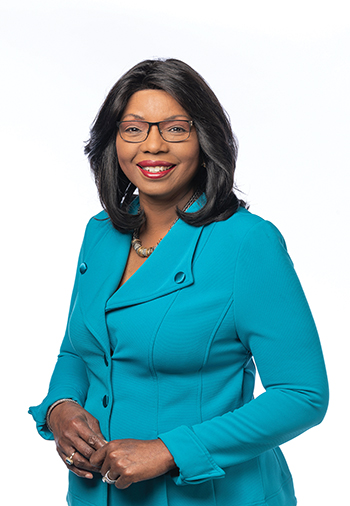Triple-Negative Advanced Breast Cancer Survivor

Don’t let metastatic breast cancer rob you of your purpose
For more than 25 years, former KSHB-41 anchor and award-winning journalist Cynthia Newsome has shared stories that shape Kansas City. Dedicated to reporting that informs and helps others, she decided early on to be an open book about her two triple negative breast cancer (TNBC) diagnoses.
When I learned that the triple negative breast cancer (TNBC) I’d had several years before had not only returned but metastasized, I instantly went into patient mode. For 20 years, I’d kept up with my annual mammograms and breast self-exams, so when I felt a lump, I immediately got moving, hoping to get on top of it early. I drew on the knowledge I gained from interviewing metastatic breast cancer survivors. That valuable information, combined with my own experience, helped me feel more prepared.
I chose to be treated at a nearby university cancer center, and my oncologist was assigned to me by chance. Coincidentally, I’d interviewed her before I was ever diagnosed with breast cancer. I was thrilled to have her as my doctor because she is both a TNBC researcher and a clinician. Not only is she well-versed in every area of TNBC, she sees patients on a regular basis.
I was very comfortable with her, and that is something I’d encourage other people to look for when selecting a doctor. Some people like to follow their doctor’s advice completely. Others, like me, want to collaborate. So, it’s important to me to have a doctor who listens, offers advice, allows me to share my feelings and considers my opinions. I am happy to work alongside someone who understands my priorities.
She examined my original breast cancer tissue from my 2011 tumor and then compared it to the 2019 tumor that became metastatic. Once she understood more about my breast cancer, she was able to offer treatment options. My husband Ed and I talked through each treatment option with her…what the drugs did, the proposed treatment plan, and what would happen next. Even though metastatic disease is lifelong, I was anxious to get started to try to stop the cancer from growing and continuing to spread throughout my body.
I started on therapy that combined chemotherapy with immunotherapy. Then my doctor suggested a clinical trial. I hadn’t participated in one before, but she explained the treatment in the trial might be more responsive to the molecular structure of my tumors. My husband and I felt it would be the right thing for me and loved the idea that participating could benefit others in the future.
At first, the trial medication left me feeling dizzy, like I was drugged. My doctor was able to reduce the dosage to make it more tolerable. Sometimes I still get very tired, but I’m able to work all day. I haven’t had to manage many other side effects. I do have neuropathy, but overall, I’m doing great.
I’m surrounded by supportive people, starting with my husband. He said from the beginning, “You have the cancer in your body, but I have it, too.” That is how close he feels to it. He keeps an eye on my physical and mental health, my energy level, my clarity. He always supports me, and he makes sure we have fun.
He also makes sure to take care of himself. He works and is very involved in our church. Like everyone else during COVID-19, we couldn’t get together with family much, and Ed and I missed that. Now that we can gather with family, it really makes us happy.
My colleagues at KSHB-41 are also very encouraging. In my new role as the Community Relationships Director, our station General Manager is understanding and supportive when I need to take off for treatment or to recuperate. She knows I’ll get the job done, and she gives high priority to family and health.
Adult volunteers at Awesome Ambitions, a college and career readiness program I founded in 1997 for 8th through 12th grade girls in the greater Kansas City area, help shoulder the burden when I need time away.
I also rely on my faith, pastor and church community.
After my first diagnosis, Ed and I decided to share our story. I have interviewed people all my life and I see how their stories help others. It’s nice to hear from people who are praying for me or sending positive thoughts my way. Sometimes they share their stories with me, too.
Advice from Cynthia
• Reality is reality. I have metastatic breast cancer, but I know I’m still here for a reason. God has a purpose for me. I believe that purpose is to make a positive difference in other people’s lives. Do what you can to fulfill your purpose.
• Metastatic breast cancer can eventually outsmart the medications. Don’t be surprised if you have to change your medicine. I wanted all the information I could find about my options so I would be equipped to make the necessary decisions. Everyone has a different reaction and response to their diagnosis, so it’s important to listen to your doctor, and listen to your body; don’t expect someone else’s experience to be the same for you.
• Know how to encourage yourself. Find the positive people and meaningful, fun activities that make you happy. Surround yourself with a positive support system.
• Never give up hope.


